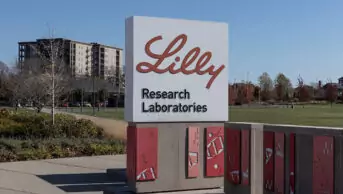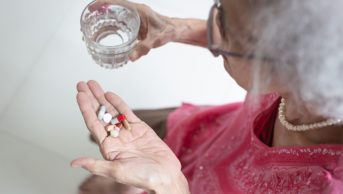
MAG
Dementia currently affects more than 800,000 people in the UK, with this number expected to rise to 1.4 million by 2025[1]
. To date, there is no effective cure and, while the medicines available to treat dementia can ease some symptoms, there are concerns about exactly how beneficial they are (see Box 1).
In addition, some of the medicines used to treat challenging behaviour in people living with dementia, such as antipsychotics, have been associated with harm. As a result, novel avenues to help manage dementia symptoms more effectively and, preferably, without the need for medicines, are desperately needed.
“The risks of pharmacological therapy are well documented,” says Anne Child, pharmacy and dementia specialist lead at the Royal Masonic Benevolent Institution Care Company, which operates 18 care homes in England and Wales.
Low-dose antipsychotics lead to an increased risk of strokes, increased risk of mortality and there are only a small number of people who actually benefit
“Low-dose antipsychotics [lead to an] increased risk of strokes and increased risk of mortality, and there is only a small number of people who actually benefit,” she explains.
Antipsychotics, with the exception of risperidone and haloperidol in some circumstances, are not licensed in the UK for treating non-cognitive symptoms of dementia. However, antipsychotics are often prescribed off-label for this purpose[2]
.
Concerns regarding the risks and limited benefits of antipsychotic drugs for treating the symptoms of dementia are well known and a significant effort has been made to try and reduce the use of antipsychotics in people with dementia, particularly as a first-line response[3]
.
National Institute for Health and Care Excellence (NICE) guidance, published in June 2018, recommends that before starting any treatment for distress in people living with dementia – pharmacological or non-pharmacological – a structured assessment should be carried out to explore possible reasons for their distress and address clinical or environmental causes[1]
.
People have been quick to give sedation to calm patients with dementia, but they’re not always looking at what is making the person behave that way
“Investigate before you sedate,” says Anita Ruckledge, lead dementia nurse at the Mid Yorkshire Hospitals NHS Trust. “In the past, some people have been quick to give sedation to calm patients [with dementia], but they’re not always looking at what is making the person behave that way.”
According to Dementia UK, distressed behaviour can occur when an individual becomes disorientated, frightened or anxious, for example, if they do not recognise the place they are in as home or if they are in pain.
For people living with mild-to-moderate dementia, NICE recommends offering group cognitive stimulation therapy, as well as considering group reminiscence therapy, cognitive rehabilitation or occupational therapy.
These non-pharmacological approaches offer many benefits for people with dementia, without any harmful side effects. Cognitive stimulation and reminiscence therapy, for example, have been found to have worthwhile benefits relating to cognition, communication, daily functioning and quality of life, and some interventions have also been found to help family members[4],[5]
. However, these treatments are not always available in hospitals. Data obtained by The Pharmaceutical Journal under the Freedom of Information Act revealed that 44% of the acute trusts that responded offered one or more of the therapies recommended by NICE, and just under a fifth (17%) said that they offered all of them.
Box 1:
Clinical effectiveness of dementia drugs called into question
A 2018 Cochrane review of donepezil trials found moderate-quality evidence that people with mild, moderate or severe dementia owing to Alzheimer’s disease who were treated for 12 or 24 weeks experienced small benefits in cognitive function, activities of daily living and clinician-rated global clinical state. However, the clinical importance of these improvements for patients remains unclear.
Memantine, donepezil, rivastigmine and galantamine are licensed for Alzheimer’s disease dementia, but the National Institute for Health and Care Excellence also recommends off-licence use for adults with dementia with Lewy bodies.
In May 2018, France became the first country in Europe to decide that payments for memantine, donepezil, rivastigmine and galantamine would no longer be reimbursed under the French healthcare system.
The French health authorities explained that their decision to delist these four drugs was a result of ongoing concerns about the clinical meaningfulness of their effects on cognition, behavioural symptoms or quality of life.
They argued that the availability of the medicines was diverting the attention of clinicians, researchers and policy makers away from non-pharmacological approaches to dementia care.
Sources: National Institute for Health and Care Excellence[1]
; BMJ
[6]
; Cochrane Database Syst Rev
[7]
Reminiscing with patients
Several of the trusts that provide non-pharmacological therapies for patients centre their offering around reminiscence therapy.
University Hospital Southampton NHS Foundation Trust strives to take a person-centred approach to dementia care. Staff are encouraged to work alongside the person with dementia and their family members to find out about their background, life experiences, and likes and dislikes, in order to put together a ‘this is me’ document — a leaflet that can be used to record details about a person who cannot easily share information about themselves. The aim is to help health and social care professionals to understand the best way to support a patient.
A lot of our approaches come from having the opportunity to spend time with the patient, perhaps on a one-to-one basis
“A lot of our approaches come from having the opportunity to spend time with the patient, perhaps on a one-to-one basis, and using their [‘this is me’] document as a launchpad into (hopefully) some very meaningful, sensitive, thoughtful and enjoyable conversations,” explains Sarah Mould, specialist practitioner for dementia and delirium at the trust.
The trust has a designated space within the ‘medicine for older people department’, known as “the hub”, which offers a variety of activities for patients with dementia, including the use of reminiscence through conversation, music and song, film, photographs, baking and leisure activities, and storytelling.
At the Mid Yorkshire Hospitals NHS Trust, the team uses computer software called ‘MyLife’ to carry out group or bespoke reminiscence therapy. The software contains a variety of old movies, games and music, and the team also asks families to bring in photographs to stimulate and evoke conversations.
However, the team is keen to move away from the term “reminiscence” because it puts pressure on patients to remember.
“When you use the word ‘reminiscence’, patients can feel pressured to think back,” explains Ruckledge. “But if we do things that can trigger those thoughts, such as using sensory boxes, it removes that pressure.”
It is important to celebrate the things the person can still do rather than focus on what they are struggling with, Ruckledge says (see Box 2).
Box 2:
Case study
“We had a lady in her late 80s with advanced dementia who had not had a conversation with her husband for 10–11 months. He asked us if he could bring her into one of our reminiscence sessions as although he didn’t think she would be able to join in, he said it would be a change of scenery.
“When the couple came to the session, we asked what music they liked and they said Engelbert Humperdinck. When we played the song, the first thing we noticed was that she started tapping her fingers and toes. She also looked up, took her husband’s hand, stroked it and then sang the song from start to finish.
“Sometime later, that gentleman knocked on my office door and said ‘Thank you. I got my wife back for those few minutes and that’s how I’m going to remember her.’
“You can never underestimate the power of music.”
The Mid Yorkshire Hospitals NHS Trust – Anita Ruckledge
At Chelsea and Westminster NHS Foundation Trust, a lot of the dementia team’s work is funded by the trust’s charity, CW+. This includes a partnership with the Museum of Brands in London, a museum exploring consumer culture over the past 150 years.
“The [museum team] comes in every Thursday to provide reminiscence sessions on the ward but [the museum] has also provided some equipment to one of our case managers, who provides reminiscence sessions with the patients [on other days],” says Sarah Bryan, lead clinical nurse specialist for older adults and frailty at the trust. These items include retro-branded soup tins, washing powder boxes and bars of soap that have been in production for many years. These are used as conversation starters and to prompt long-term memories.
“It has generated interest from other members of our team to get involved with delivering these sessions when the museum [team] is not here,” she adds.
CW+ has funded several other initiatives at the hospital, including a pilot of a new cognitive engagement activity support post. The role, usually seen in care homes, works exclusively with patients living with dementia or experiencing delirium, either on a one-to-one basis or in groups, and tailors activities to patients’ interests and needs.
Although still early in the pilot, which started in October 2019, Bryan can already see the positive impact it is having on patients and the team will continue to evaluate it every three months for the next year.
“The post is in the care of the elderly medical ward [so we] can do direct comparisons with other similar wards, such as length of stay, number of falls, number of incidence reports, [and we’ll] look at patient experience as well.”
The trust is also about to start another project, in partnership with the charity and an external organisation, to look at the impact of tailored music therapy for patients, with the aim of making it an integral part of the patient journey from admission to discharge.
“We can potentially create musical ‘passports’ for patients,” says Bryan. “And we might be looking to secure some funding to give patients an iPod and develop a personalised playlist so we can engage with them and reminisce.”
Sensory exploration
However, non-pharmacological approaches are not just about reminiscing — a lot of approaches involve stimulating the senses.
We’re starting to learn more about the sensory needs and the challenges people may experience because of dementia
“We’re starting to learn more about the sensory needs and the challenges people may experience because of dementia. Their sense of taste, touch and smell can change because of the disease process,” explains Mould.
The team at the University Hospital Southampton NHS Foundation Trust works with patients to find sensations they prefer – one of the MRI suites at the hospital has been decorated to provide a calming environment for patients with dementia. There is also an enhanced dementia care ward in the trust, which has been designed to provide an enabling environment through use of light and colour, non-reflective and consistent flooring, noise reduction systems and objects which provide comfort or stimulation.
The team is thinking about how to bring those experiences to the bedside, for example, through everyday sounds, smells, music, and even food and drink.
In the longer term, the team is keen to use dementia care mapping, an observational tool developed by the University of Bradford, to observe the experiences of a group of people with dementia and collate information about how they feel during the sensory stimulation sessions.
“The process of mapping is very intense and doesn’t easily lend itself to an acute hospital environment,” explains Mould. “We’re looking at developing a tool that may just look at a few factors: do they look happy or distressed?; what difference did it make?”
Involving families
Non-pharmacological approaches can benefit families as well as patients. Ruckledge explains how at the Mid Yorkshire Hospitals NHS Trust, families and carers are included in dementia training to help them develop techniques to cope with the challenging situations that may arise once their loved one is discharged from hospital.
We train families to distract the person living with dementia rather than argue with them
“Families are the worst people for arguing with [their loved one] which can make [their loved one] feel very frustrated,” she says.
“We train the families to distract [the person living with dementia] rather than argue with them.”
Bryan says that working with the families enables them to take away ideas about how to help their relative at home. “It’s tricky to get the support that people need, but this enables them to go home with some ideas: [for example], when ‘Fred’ was given a puzzle he was really calm and engaged.
“It potentially takes some pressure off,” she adds.
“People with dementia are often embedded in families and relationships with others,” says Karen Harrison Dening, head of research and publications at Dementia UK.
“It is difficult to think about the psychosocial interventions for a person with dementia without also thinking about [the needs of their] family and carers too.”
Moving into the mainstream
While the benefits of using non-pharmacological therapies in dementia care are becoming clearer, it will be some time before they are a standard part of care across the country.
“The problem with NICE is that it can only make recommendations for practice where there is supporting evidence,” says Harrison Dening.
“A lot of the psychosocial interventions are seen to be at the ‘softer’ edge of research … but if we’re still not able to come up with a hard treatment or cure then we should really be focusing a lot of attention to the people who already have a diagnosis of dementia, to make their lives better.”
Some of the national audits as to what’s available for families affected by dementia can be a bit of a tick-box exercise
She says that although dementia awareness is increasing, more needs to be done to encourage service providers to do more in terms of psychosocial interventions, since many do not even provide the minimum requirements or understand why these interventions are so important.
“Some of the national audits as to what’s available for families affected by dementia can be a bit of a tick-box exercise. Some services might say they provide cognitive stimulation therapy, for example, but … you often find it’s not open to everyone, but targeted towards only a few individuals or in certain circumstances.
“It needs to be a mandated in all localities that all services and providers work together in a proper strategic way.”
Harrison Dening highlights how some of the psychosocial interventions, such as gardening or listening to music, are simply activities that a person may have actively enjoyed before they were diagnosed. But, sadly, a diagnosis of dementia can result in such activities then becoming a ‘therapy’ which requires research, an evidence base and commissioning.
“It’s almost as if we lose sight of what a person generally enjoys, or has the capacity to enjoy, when a diagnosis of dementia is made. It has the effect of making the world see them differently and like they’re no longer the person they were,” she says.
Child says that a holistic approach is needed.
“There are some people that would benefit [from medicines],” she acknowledges. “But the idea is that you look at that person as an individual and consider non-pharmacological interventions so you can formulate a support plan that limits distress or recognises the precursors to distress, meaning you can modify the environment.
“With dementia, you’ve got to cover all those bases to [help patients] remain as independent as possible.”
Special report: Non-drug interventions
This article is part of a special report on the increasing use of non-pharmacological treatments in the health service. Click here to find out more
References
[1] National Institute for Health and Care Excellence. 2018. Available at: https://www.nice.org.uk/guidance/ng97/resources/dementia-assessment-management-and-support-for-people-living-with-dementia-and-their-carers-pdf-1837760199109 (accessed February 2020)
[2] National Institute for Health and Care Excellence. 2015. Available at: https://www.nice.org.uk/advice/ktt7/chapter/Evidence-context (accessed February 2020)
[3] Medicines Healthcare and Regulatory products Agency. 2014. Available at: https://www.gov.uk/drug-safety-update/antipsychotics-initiative-to-reduce-prescribing-to-older-people-with-dementia (accessed February 2020)
[4] Woods B, O’Philbin L, Farrell E et al. Cochrane Database of Syst Rev 2012(3). doi: 10.1002/14651858.CD001120.pub3
[5] Vernooij-Dassen M, Moniz-Cook Esme, Verhey F et al. Aging & Mental Health 2019. doi: 10.1080/13607863.2019.1693968
[6] Walsh S, King E, Brayne C et al. France removes state funding for dementia drugs. BMJ 2019;367:I6930. doi: 10.1136/bmj.l6930
[7] Birks J & Harvey R. Cochrane Database Syst Rev 2003(3). doi: 10.1002/14651858.CD001190


